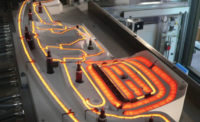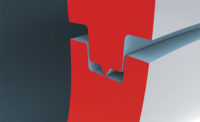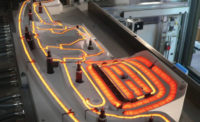Comparing Permanent and Nonpermanent Fastening Methods
|
|
Joint Characteristic |
Cost |
|||||||||
|
|
Articulation |
Clamp load |
Low profile |
Vibration resistance |
Hole fill |
Aesthetics |
Fastener |
Machining |
Equipment |
Labor |
Overall |
|
Tenon + orbital |
Best |
Good |
Best |
Fair |
Fair |
Best |
Best |
Fair |
Good |
Good |
Good |
|
Tenon + hot upset |
Poor |
Best |
Best |
Best |
Best |
Fair |
Best |
Fair |
Poor |
Good |
Good |
|
Solid rivet + |
Poor |
Fair |
Best |
Good |
Best |
Good |
Good |
Best |
Fair |
Best |
Good |
|
Semitubular rivet + |
Good |
Fair |
Best |
Fair |
Fair |
Good |
Good |
Best |
Good |
Best |
Best |
|
Rivet + orbital |
Best |
Fair |
Best |
Fair |
Fair |
Best |
Good |
Best |
Good |
Good |
Good |
|
Rivet + hot upset |
Poor |
Best |
Best |
Best |
Best |
Fair |
Good |
Best |
Poor |
Good |
Good
|
|
Bolt and nut, |
Poor |
Best |
Fair |
Good |
Poor |
Poor |
Poor |
Best |
Fair |
Poor |
Fair |
|
Bolt and nut |
Fair |
Best |
Fair |
Good |
Poor |
Poor |
Poor |
Best |
Good |
Fair |
Good |
|
Stud and nut |
Poor |
Best |
Fair |
Good |
Poor |
Fair |
Poor |
Good |
Good |
Fair |
Fair |
|
Screw |
Poor |
Good |
Best |
Fair |
Poor |
Good |
Fair |
Good |
Good |
Fair |
Good |
|
Retaining ring |
Best |
Poor |
Poor |
Poor |
Poor |
Good |
Poor |
Best |
Best |
Poor |
Good |
|
Cotter pin |
Best |
Poor |
Poor |
Poor |
Poor |
Poor |
Poor |
Best |
Best |
Poor |
Good |
Every application is different, and there is no “one size fits all” solution for permanent part assembly.
This matrix rates permanent and nonpermanent fastening processes for various joint requirements. For these ratings, we examined the lowest cost and least number of machining steps to achieve the requirement in the simplest way possible. For example, a low-profile joint can be achieved with a countersink or counterbore—at the cost of extra machining. Similarly, aesthetics are greatly determined by the type of fastener and its coating or finish, which greatly impacts its cost. A retaining ring or cotter pin is a more expensive fastener, compared with a rivet, especially if that cost includes a mating pin with a groove or through-hole. Overall cost considerations include the fastener, machining, equipment and utilities, and labor costs.
All cost estimates are relative to each other across processes. For example, a tenon has no fastener, and therefore, no fastener cost relative to a rivet or bolt, but a machined tenon has a greater machining cost than a through-hole for a rivet or bolt. A tenon formed as a casting would result in a different costing analysis.










